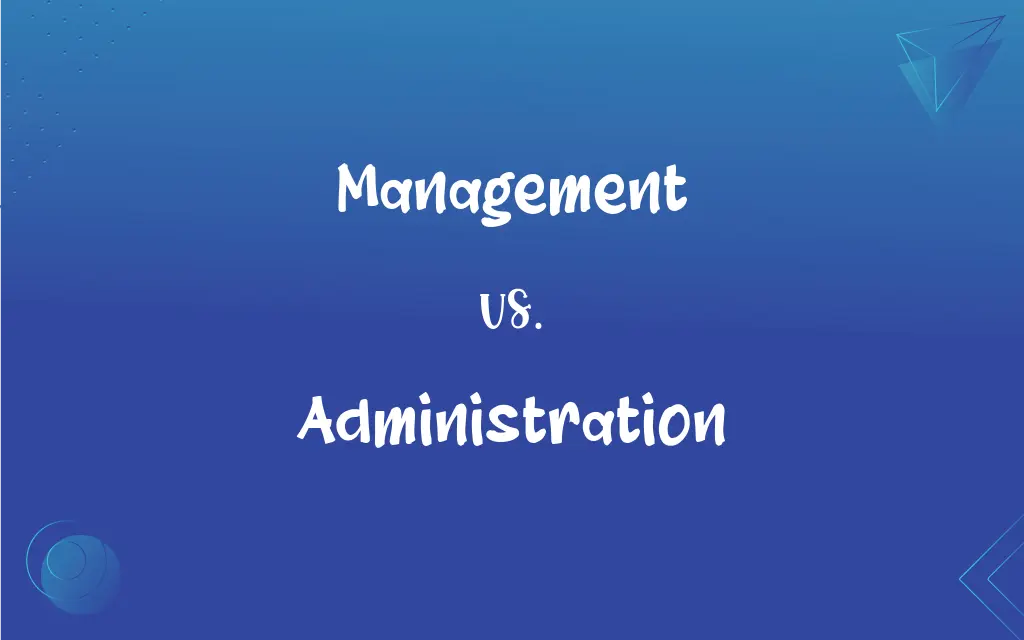Management vs. Administration: What's the Difference?
Edited by Janet White || By Harlon Moss || Updated on October 5, 2023
Management is the act of coordinating efforts to achieve goals. Administration is overseeing, directing, and controlling operations.

Key Differences
Management involves making decisions related to the planning, organizing, and running of a business to meet objectives. Conversely, administration is more about creating, setting, and monitoring the policies and processes by which an organization is run.
Management often delves into the day-to-day operations, handling aspects like resources, personnel, and project execution. Administration, however, is more concerned with formulating rules, policies, and guidelines to ensure organizational consistency.
Management is typically seen as a lower-level function because it is applied to the executional level of operations. Administration typically operates at a higher level since it involves developing policies that guide management practices.
In a business context, management focuses on executing plans, managing people, and utilizing resources effectively to achieve objectives. In contrast, administration emphasizes devising those strategic plans and establishing the overarching guidelines that management will adhere to.
Whereas management plays a crucial role in motivating employees, overseeing operations, and making tactical decisions, administration focuses on ensuring that the organizational structure is stable, and the established policies are being adhered to.
ADVERTISEMENT
Comparison Chart
Focus
Achieving organizational goals
Formulating policies and procedures
Level of Operation
Operational/tactical
Strategic/organizational
Main Functions
Planning, organizing, directing
Policy-making, setting guidelines
Decision-Making
Often quick and related to daily operations
Typically involves comprehensive, strategic decisions
Primary Concern
Implementation of policies
Creation and monitoring of policies
ADVERTISEMENT
Management and Administration Definitions
Management
Management is the coordination and organization of tasks to achieve a goal.
Effective management led to a 20% increase in the company's profits.
Administration
Administration can denote the process of managing and implementing government or organizational policies.
The new administration has vowed to tackle climate change aggressively.
Management
Management can refer to the group of individuals who make decisions about how a business is run.
The management decided to implement a new working hours policy.
Administration
Administration is the act of managing duties, tasks, or a government.
The mayor’s administration worked tirelessly to improve the city’s infrastructure.
Management
Management also implies the responsibility for controlling or administering an organization or group of staff.
She was promoted to a management position.
Administration
Administration involves the supervision, leadership, and actualization of policies and rules.
The school administration is responsible for ensuring students' safety.
Management
Management is the skill of dealing with people successfully.
Her management of the diverse team facilitated innovative solutions.
Administration
Administration refers to the activities and tasks related to operating an organization.
The administration of non-profit organizations can be challenging.
Management
Management denotes the process of dealing with or controlling things or people.
His management of the crisis was praised by the board.
Administration
Administration implies the organized arrangement and coordination of operations to ensure smooth flow.
Proper administration ensures that organizations run smoothly.
Management
The act, manner, or practice of managing; handling, supervision, or control
Management of factory workers.
Administration
The act or process of administering, especially the management of a government or large institution.
Management
The person or persons who control or direct a business or other enterprise.
Administration
The activity of a government or state in the exercise of its powers and duties.
Management
Skill in managing; executive ability.
Administration
The executive branch of a government.
FAQs
Define management in a corporate context.
Management involves planning, organizing, leading, and controlling an organization’s resources to achieve specific goals.
Can management and administration roles overlap?
Yes, in some organizations, especially smaller ones, management and administration roles can often overlap due to the scale and flow of tasks.
Why is effective management essential in an organization?
Effective management ensures optimal use of resources, successful task execution, employee motivation, and achievement of organizational goals.
How does management handle organizational conflicts?
Management addresses conflicts by identifying issues, facilitating dialogue, implementing resolution strategies, and ensuring a harmonious working environment.
Can an organization function without management or administration?
While an organization might operate for a short period without management or administration, these elements are crucial for long-term sustainability, growth, and legal compliance.
Is management only applicable to business entities?
No, management concepts apply to any entity, including non-profits, government bodies, and educational institutions, that require coordinated efforts to achieve goals.
What are the key functions of management?
The key functions of management typically include planning, organizing, leading, and controlling.
How is administration different in public and private sectors?
While the core of administration in both sectors involves overseeing operations and policy enforcement, public sector administration often includes additional regulatory compliance and public service delivery.
What is a management strategy?
A management strategy is a carefully crafted plan designed to achieve organizational goals by utilizing resources optimally and coordinating various tasks and processes.
How does administration influence corporate culture?
Administration influences corporate culture by establishing policies and an operational framework that can shape the work environment and organizational behavior.
Why is change management crucial in organizations?
Change management is vital for ensuring smooth transitions, minimizing resistance, maintaining productivity, and successfully implementing new initiatives within an organization.
How does administration address legal compliance in an organization?
Administration ensures legal compliance by implementing policies, conducting audits, overseeing operations, and ensuring all organizational processes adhere to applicable laws and regulations.
In what way does administration deal with financial aspects?
Administration deals with financial aspects by overseeing budgeting, ensuring fiscal compliance, managing funds, and implementing policies that secure financial health.
What is administration in terms of organizational structure?
Administration refers to setting policies, making decisions, and ensuring the organization operates smoothly within the established framework.
What role does administration play in educational institutions?
Administration in education involves setting educational standards, establishing policies, ensuring adherence to regulations, and overseeing smooth operation.
Can a good administrator be a good manager and vice versa?
While the skills for administration and management can overlap, excelling in both roles may require adapting to the distinctive demands and responsibilities of each.
What is the role of management in team dynamics?
Management plays a pivotal role in team dynamics by facilitating communication, resolving conflicts, fostering a positive environment, and coordinating efforts towards common goals.
How does administration manage risk in an organization?
Administration manages risk by developing policies and procedures that identify, assess, and mitigate potential risks, ensuring organizational stability and compliance.
How does administration impact the functionality of a governmental body?
Administration in government implies enforcing laws, ensuring smooth public service delivery, and implementing policies and programs.
What are some common management styles?
Common management styles include autocratic, democratic, laissez-faire, and transformational, each varying in decision-making approaches and employee involvement.
About Author
Written by
Harlon MossHarlon is a seasoned quality moderator and accomplished content writer for Difference Wiki. An alumnus of the prestigious University of California, he earned his degree in Computer Science. Leveraging his academic background, Harlon brings a meticulous and informed perspective to his work, ensuring content accuracy and excellence.
Edited by
Janet WhiteJanet White has been an esteemed writer and blogger for Difference Wiki. Holding a Master's degree in Science and Medical Journalism from the prestigious Boston University, she has consistently demonstrated her expertise and passion for her field. When she's not immersed in her work, Janet relishes her time exercising, delving into a good book, and cherishing moments with friends and family.































































